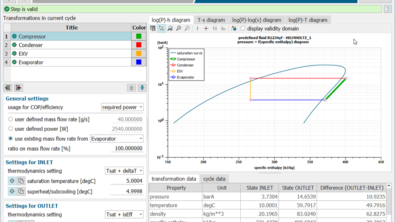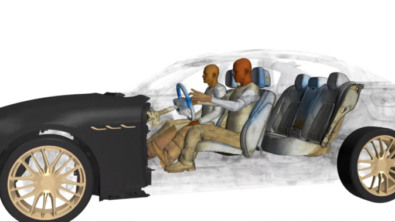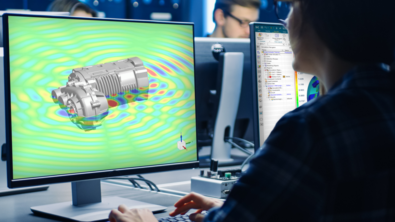International Women’s Day – Elspeth Mosedale
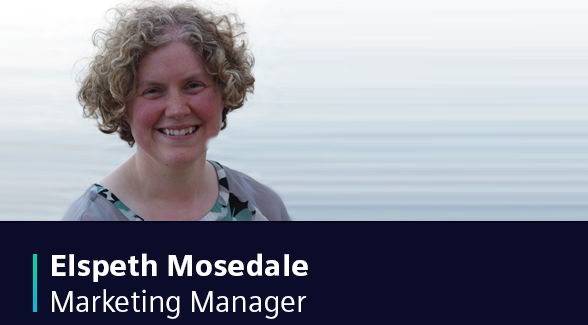
“What I really enjoy doing, and what I excel at, is sharing my enthusiasm for what our simulation software and test tools can do for our customers.”
Elspeth Mosedale
Can we start by learning what your role is at Siemens?
I’m a marketing manager for Simcenter, so I’m in charge of creating content for our campaigns, which help our customers and potential customers learn more about our solutions. The goal is to show how Siemens can help them and how they can help themselves with Siemens products.
How long have you been at Siemens?
I joined the company about five years ago, as one of Siemens’ many acquisitions.
How long have you been in marketing?
About the same! Five years. I switched over to this role when I joined the company. My background is more technical, I have a Physics degree and a PhD in Applied Physics. I initially worked in the technical side of the industry before moving across to marketing. It’s a useful background to have because I can “talk shop” with our customers and prospects and position our products and services in the sort of language that they want to hear.
With such a deeply technical background, how have you found the transition to marketing?
It was a good transition. For me, it was a gradual process of realising that my main strength – my “superpower” if you like – is communication. Although I always loved getting hands-on and technical and coming up with new ideas, I didn’t always enjoy the painstaking process of turning those ideas into a finished product.
What I really enjoy doing, and what I excel at, is sharing my enthusiasm for what our simulation software and test tools can do for our customers. Marketing is the perfect vehicle for that. I’m still exposed to the technical side of things – I’m always chatting and sharing ideas with the engineers on the team and enjoy that very much – but now I focus on translating/sharing engineering stories with a wider audience.
What do you enjoy most (and least!) about working for Siemens?
This is the first big company I’ve worked for. My previous employers were relatively small. This has both advantages and disadvantages, as you can imagine.
On the positive side, being such a large company gives Siemens a lot of power and the ability to take a strong stance on things that it feels are important. When Covid-19 hit, our Chief Executive assured everyone that there would be no redundancies because of the pandemic. I remember being hugely impressed that the company had that level of confidence in itself to be able to make such a bold promise. And that confidence trickles down through the ranks to give you the confidence to perform your role to the best of your ability. Plus, the sheer size of Siemens means that there is plenty of opportunity to move around. Whatever your career aspirations, there is an opportunity here for you.
The downside of that is there can be a lot of admin. Things can move very slowly and it’s often difficult to find the best person or team to speak to when you need something. But that’s the nature of working for a massive organisation and, overall, I find that the positives outweigh the negatives.
Did you feel unusual for wanting to work in engineering?
I suppose I was a bit of an anomaly, although I didn’t realise it at first! I went to an all-girls secondary school, so there were quite a few of us studying sciences at A-level. I then applied to study physics at university and just assumed that there would be lots of other women there too. So, I was a bit freaked out when I walked into my first lecture and, out of 80 students, only 3 of us were female. That was when I first realised that it was rare for women to be interested in the sciences at that level. I don’t recall being actively discouraged from pursuing a career in engineering, but it was clearly unusual for me to want to do so.
I think that’s beginning to change. I have friends with young daughters, and I see them actively considering roles that they probably wouldn’t have a few years ago, because they can see the opportunities. I was tutoring a young woman for A-level physics just before lockdown and she’s now off to University to study computer science. She’s full of enthusiasm and doesn’t even appear to have considered what effect (if any) her gender will have on her future career, which pleases me immensely.
But it’s still not equal and I don’t know why. I’m the first to shout “gender bias!” if I see it, but it’s not really that anymore. It could be that women with an interest in science are more attracted to careers based on people, such as medicine, rather than what on the surface might be “thing”-based disciplines like engineering. Certainly, of the 12 girls I did my A-levels with, I was the only one to go into engineering. The others studied to be doctors, veterinary scientists, and that sort of thing. That might be it, but I don’t really know. I can’t quite put my finger on it.
What would you say to young ladies who are considering a career in engineering?
If you are the kind of person who likes problem solving, learning how things work and wants to make a practical difference to the world we’re living in, then you’ll probably enjoy engineering. It might sound like a bold claim to say that engineers are changing the world, but we are! Everything we do in engineering and all the applied sciences is about improving the way we live, and you can play your part in that. If that appeals to you, then go for it!
But at the same time, do it your own way. Don’t think that you need to fit other people’s expectations of what an engineer must be. Not all engineering is about wearing hard hats and building bridges! This is a very broad church that encompasses a wide range of disciplines and you can absolutely design your career to focus on the things that you are curious and passionate about.
And, finally, is there any woman you particularly admire in this field?
There’s a lady I’ve always considered as a bit of a role model whom you may not have heard of. Her name is Julia Slingo. My PhD was in meteorology and she was the female lecturer in the department at the time. But if you look at her career since then she has gone on to do a huge number of things and has smashed through many “glass ceilings” on the way. She was publishing papers in her own name back when all her peers were men. She was the first woman to become president of the Royal Meteorological Society and she just keeps plugging away, doing her own thing.
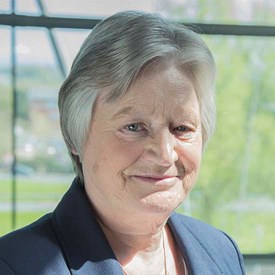
I admire her and women like her who have a quiet confidence in their own abilities and just get on with doing a fantastic job. The fact that they are female is almost irrelevant but then you notice them because they are women in disciplines that are still very much dominated by men.
They are changing the prospects for women in STEM fields without fuss or fanfare just by being awesome at what they do. I think we can all be inspired by that.
Celebrate International Women’s Day by finding out more about our female Simcenter heroes here.
